Do you hear the people sing? Do you hear the distant drums? It is the future that they bring when tomorrow comes! And tomorrow has finally arrived once again in Baltimore as the critically acclaimed national tour of Les Miserables arrives in Charm City, gracing the stage of The Hippodrome Theatre in The France-Merrick Performing Arts Center. The music is both iconic and memorable; the story is powerful and timeless. And this current national tour— a Cameron Mackintosh and NETWORKS presentation— is of the finest quality, the most remarkable production values, and features some of the most exquisite talent that the nation has to offer in musical theatre. Directed by Laurence Connor & James Powell, with Music by Claude-Michel Schönberg and Lyrics by Herbert Kretzmer, based on the novel by Victor Hugo, this stunning and sensational production of Les Miserables reaches out and touches the hearts and souls of the audience.
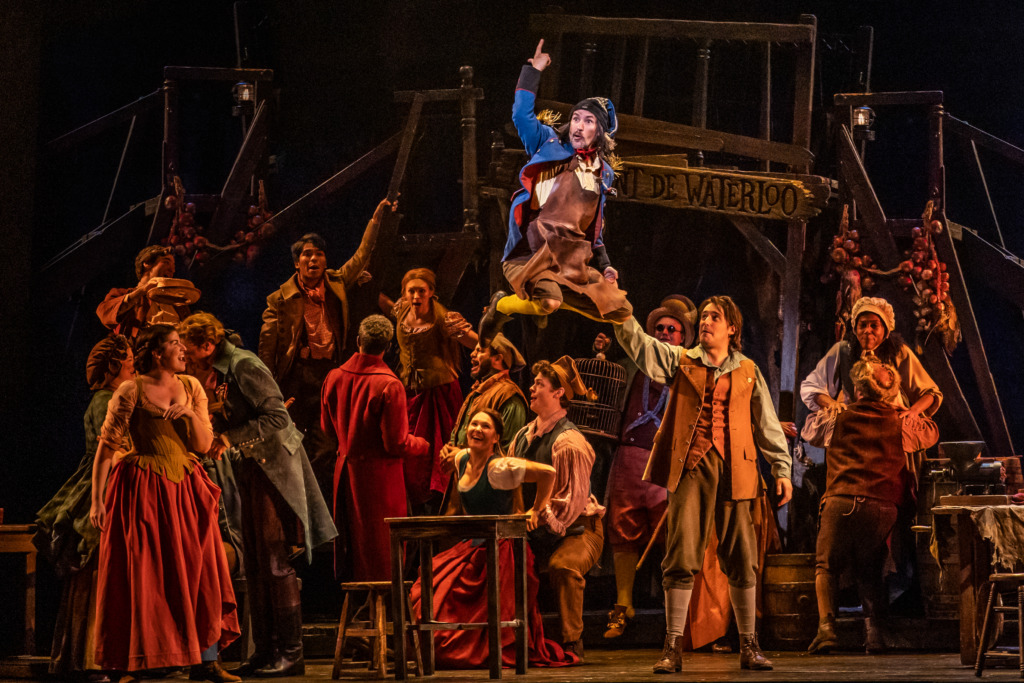
One of the most astonishing features of this touring production is how seamlessly Matt Kinley’s Set & Image Design fits into the story; it is the epitome of transportive suspension of disbelief. The audience is there on the streets of Paris, there in the sewers below, there at the barricade and the almost immersive feel is extraordinary. Kinley’s use of projections in a water-color style (inspired by the paintings of Victor Hugo) lends itself to the notion of a magical storybook— the concept that while reading a tragic fairytale with images such as these, one could fall straight into the pages and land on the stage among the talented members of the ensemble. Kinley’s combination of larger-than-life physical set-pieces and moving projected imagery creates a fantastical reality in which the story of Les Miserables is allowed to unfold. Most of the scenic pieces are cut on a sharp diagonal, giving the delightful illusion of unending depth particularly during the street scenes. Married perfectly with Paule Constable’s Lighting Design, Kinley’s scenic approach to the show is as magnificent as the talent featured in this production.
Paule Constable makes fascinating decisions regarding the lighting of the show. More obvious choices— like the ‘God Above Light’ (a white-angelic tight-beam that falls onto the face of an actor) every time a character dies and the flash-pots, which are handled with exceptional flare during the gunfire at the barricade— are expected with this particular production. But it’s the use of shadow and darkness in Constable’s lighting design that is truly remarkable. There is an intense absence of light in the opening scene on the prison ship, which is very telling of the narrative’s overall beginning— Jean Valjean toiling in darkness only to be raised through the light as the production progresses. There are a great many moments where tightly focused spotlights draw attention to who is singing; this is most impressively executed during “One Day More.”
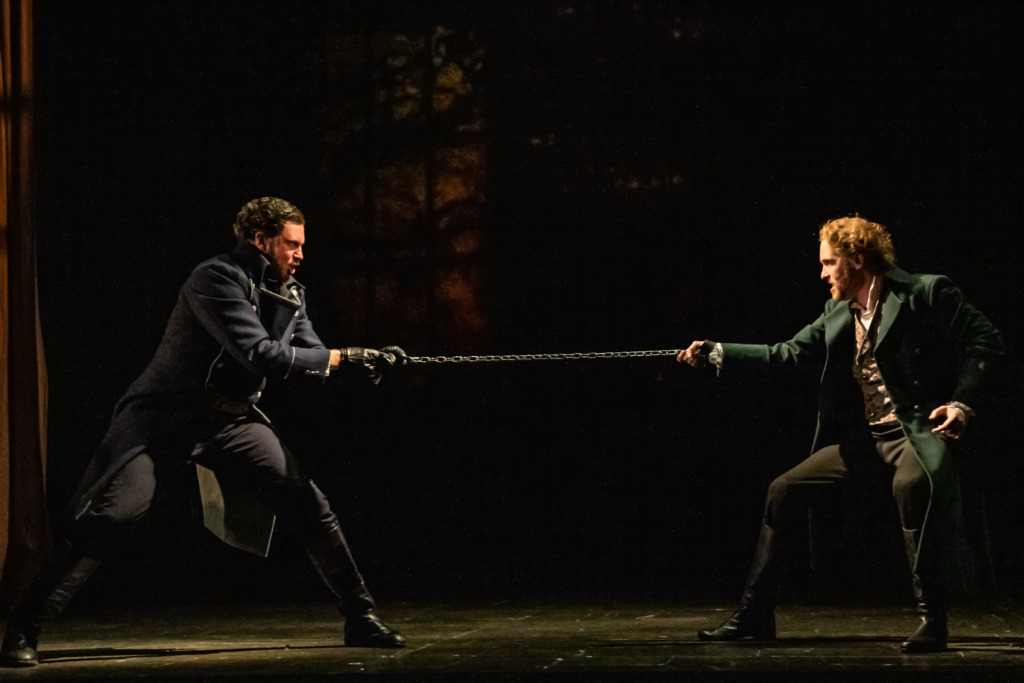
There are moments all throughout this production that reinvigorate the nearly-40-year-old musical, giving it a revitalization that speaks to the modern theatergoer without drastically adjusting, changing, or damaging the original story and emotional intention behind the libretto. Directors Laurence Connor and James Powell succeed most impressively in these little awe-inspiring moments by subtly slipping them into the show so that in the blink of an eye— you can gasp, appreciate, be awestruck and move on. One such moment that comes to mind (though the costuming is blue and gray rather than blood red and burgundy) is when the ensemble of derelict peasants, obscured visually by their hooded cloaks, form a line and in a succinct snap— the hooded cloaks vanish to reveal the line of factory women, looking like a cast-shot from The Handmaid’s Tale. It’s also the exacting attention to detail— the way little Gavroche races to comfort a bombastically out of line Grantaire during “Drink With Me to Days Gone By” and the becalmed reaction of shock given when the child tries to bear-hug him. Even the overly-gushy meet-cute just outside of Cosette’s home, complete with Romeo & Juliet style balcony-meeting and preceded by a pebble-tossed-to-the-window during “In My Life” is one just many moments that sparks freshness into the tale without derailing it from its natural course of action. The production moves fluidly, seamlessly along so much so that you never even notice over an hour and a half has gone by before you hit the intermission.
Vocal talent in this production is second to none; there are no questionable choices among the cast, each vocally holding their own in moments that truly service the music in a way that is both emotionally charged, aurally pleasing, and full of energy— even in the slower and more somber moments there is this frenetic undercurrent that courses through these songs, delivered to perfection with much heart and a great sense of purpose from every single performer on the stage. Attention should be called to each of the Students at the barricade (Andrew Marks Maughan, Daniel Gerard Bittner, Ethan Rogers, J.T. Wood, Kyle Adams, Randy Jeter, David Young.) When their voices swirl together during unified moments of songs like “Red and Black”, “Do You Hear The People Sing?” and “Drink With Me to Days Gone By”, it becomes a tidal wave of sensations pouring out to the audience. Notable players among them include Randy Jeter who doubles as The Bishop of Digne earlier in the production, blessing all ears with his reverent and graceful sound. And the animated Kyle Adams as Grantaire deserves a mention as well; his voice is as hearty and robust as any man’s on stage, but it’s all of the little asides he has and shares with Gavroche (at this performance, the undeniably spunky and peppy Harrison Fox) that make his performance truly exceptional.
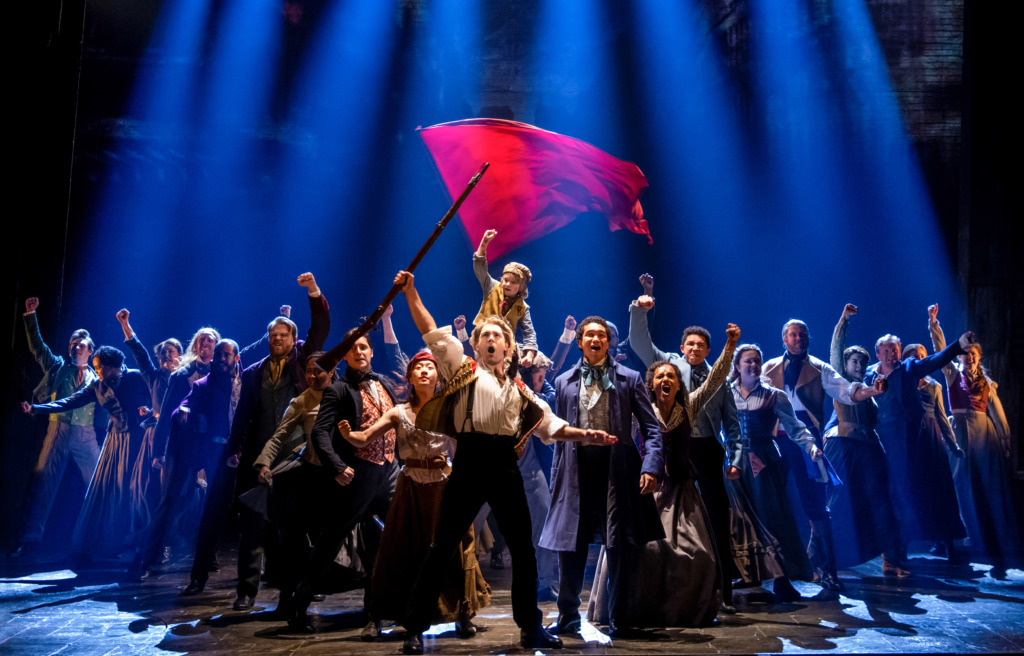
Les Misérables 📷 Matthew Murphy & Evan Zimmerman for MurphyMade
Leader of the pack is Devin Archer in the role of Enjolras. What makes Archer’s performance so unique and praiseworthy is the smoldering, slow-build he gives to the character arc. You don’t see the wild and crazed madness of a rebel with a poorly formulated cause until the barricade scene is well underway. What you get instead (and honestly, it’s preferrable, lending seasoned credibility to Archer’s understanding of the role) is a level-headed and mature calmness about him, sensibly leveling questions through song at the students who follow his lead, particularly during “Red and Black.” His voice is astonishing and little by little Archer breaks the character’s sanity into a “try or die” mentality, which is reflected astonishingly in his vocal prowess by the time the final stand at the barricade arises.
While there’s only a few moments of stage time for Little Cosette (at this performance Hazel Vogel), the solo number she delivers— “Castle on a Cloud”— is gorgeous. Simple, sweet, and very smooth, perfectly toned without pitch issues (which is so often the case for this particular number) and simply charming. You feel her pain and her plight while simultaneously seeing her hope for escape. (Vogel shares the role with Cora Jane Messer, who at this performance played the non-speaking/singing role of Young Eponine.) And while Vogel’s Little Cosette never gets to meet her mother Fantine (Haley Dortch), you get the sense that she carries that spirit with her from the time she is little until the time she grows into an adult.
Cosette (Addie Morales) as a full-grown adult, is given little in the libretto by way of character depth. Morales, however, makes moments of her own. The two most notable are when she sets eyes on Eponine (Christine Heesun Hwang), hearing Marius (Gregory Lee Rodriguez) say name, and the reaction she has to a memory she can’t fully recall, and when she’s trying to clap-back at Jean Valjean, begging him for answers about her past. There’s almost this bratty determination that populates Morales’ voice in that moment Jean Valjean, which quickly dissolves by the time Marius throws a pebble at her balcony window. Morales has a firm handle on ingenue chemistry and the trilling soprano sounds assigned to the character, “In My Life”, “A Heart Full of Love”, and her moments sung during “Finale.”
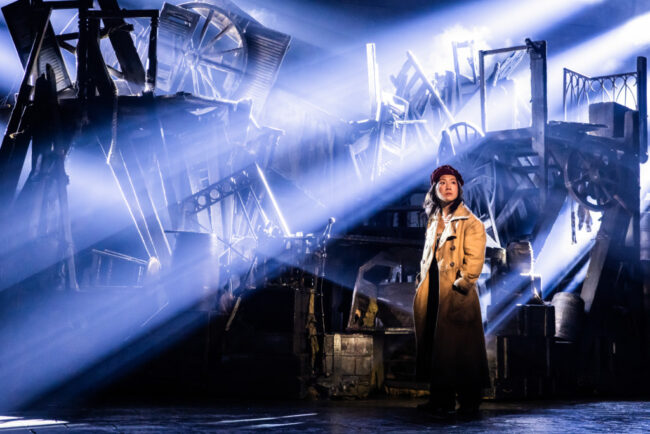
Christine Heesun Hwang is a vocal powerhouse, a true force to be reckoned with and if they ever take a production of Les Mis where female-identifying performers are allowed to tackle the role of Jean Valjean, my immediate nomination would be for her. Hwang is both gritty and lovely, bringing these two volatile components together flawlessly in her characterization of Eponine. She’s playful and charming with Marius and delivers sound like no other for her big moment in the spotlight, “On My Own.” Consistently present, even when singing through this fantasy number, one can easily drown in the tempestuous ocean of emotions she’s portraying here, and when she duets with Marius during “A Little Fall of Rain”, it’s a heartbreaking moment and not merely because of how the song concludes. As the skippy male ingenue, Gregory Lee Rodriguez allows his Marius to meander all around the fine line of ‘as written’ versus ‘new creation.’ There are moments when you can see that Rodriguez is delivering a textbook version of Marius and yet there are other times when his superb vocals belay a sense of deep emotional connection to the character— this is particularly true during “Empty Chairs at Empty Tables” (the staging of which is handled so gracefully and so beautifully it deserves another feather in the cap of the blocking-directing team.)
In a show whose title literally translates to “The Miserable”, one cannot help but be relieved that there is some earnest comedic relief squeezed into the performance. Thénardier (Matt Crowle and Mme. Thénardier (Christina Rose Hall) are that relief and these two actors are playing up the roles like they were ripped directly from a British panto. Hall adapts a growling sound for much of her singing, which only serves to add to the hilarity of her character (and good grief that dress during the wedding scene… props to original Costume Designer Andreane Neofitou), and her overall gesticulations— particularly during “Master of the House” warrant belly-busting laughs. Crowle, as the crowd-pleasing clown, has the finest physicality when it comes to infusing comedy into his movements. He’s also blessed with a powerful voice that can evoke laughter during the comedic-relief numbers and uneasy trepidation during “Dog Eats Dog” The pair of them make for a screaming hoot, particularly during “Thénardier Waltz” and near the end of the production during “Beggars at the Feast.”
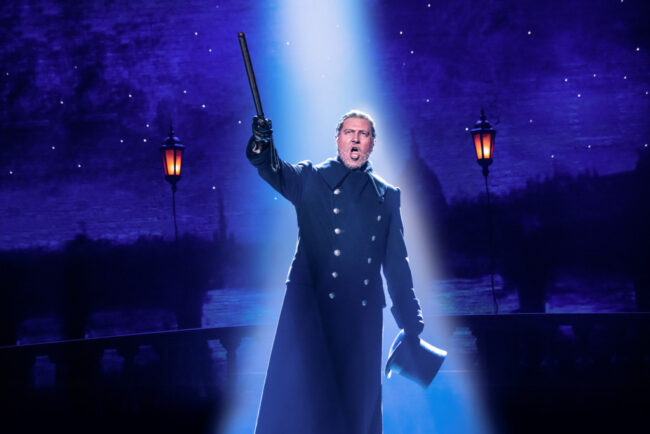
Exacting, terrifying, and deeply immersed in the rule of the character, Preston Truman Boyd delivers a masterful performance as Inspector Javert. While the character arc for this antagonizing individual is more of a plateau with a sudden and steep drop, Boyd has little moments where you can see the humanity of his portrayal filtering through. They’re true “blink” moments, where if you blink you’ll miss them, but they add a multitude of layers to the character’s otherwise static existence. One such is after the barricade is cleared and he takes a knee to deliver the sign of his faith in a very shocking moment. Boyd has a gloriously deep and well-tuned vocal instrument at his command, making his featured solo “Stars” a near-show-stopper by its conclusion. And the effects used to enhance his emotional turmoil at the end of “Soliloquy” are as remarkable as the gravity with which Boyd brings to the number. Matched exactingly against Nick Cartell (playing Jean Valjean), Boyd serves as the perfect nemesis to Cartell and numbers like “The Confrontation” will bring you right to the edge of your seat to see these two performers blasting the number in each other’s face while carrying out meticulous fight choreography.
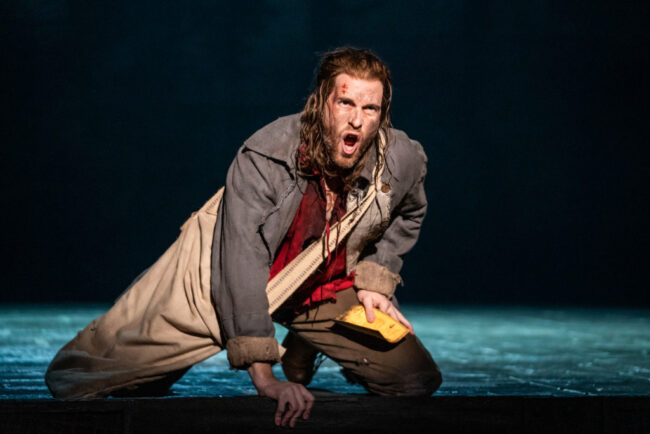
The dynamic and mercurial role of Jean Valjean in the capable and extraordinary hands of Nick Cartell is one worth praising for as many days as the show is in town. Channeling an unyielding maelstrom of emotions throughout the performance you get a plethora of characters all rolled into one performance by Cartell as Jean Valjean. Aside from the fact that he’s got screaming-rock tenor capabilities (as readily evidenced by those high-sustains he belts at top power during the never-ending prologue, “…took my FLIGHT”) he has pitch-perfect control over all aspects of his impressive vocal range. And there’s a raw, indescribable sense of desperation that reads in every moment, whether Cartell is singing to another performer on stage— like when he addresses Fantine at various points of their interaction— or singing aloud to himself, like during “Soliloquy” (his version, immediately following “Prologue”) or “Who Am I?” Cartell even deftly navigates the moment that Fantine later describes— “…you were there, but turned aside…” you see him telling the factory foreman to sort it out (when Fantine and the Factory Worker Woman get pulled apart from their cat-fight) and he watches for a moment, ascending the stairs to leave, pauses, turns back, thinks about interceding, and then chooses to carry on with his exit. It’s a powerful, striking moment, and it’s delivered without word, sung or spoken. The moment where Cartell melts your heart is “Bring Him Home” because it’s more than just a showcase of his vocal talents, more than just a display of his range-capabilities and emotional depth— it’s a conversative argument that he’s having between Marius and God. The phenomenal direction that he guides this number is unlike anything I’ve ever seen when it comes to this song (and I’ve seen Les Mis 21 different times including Cartell on tour in 2019. He’s grown. It’s astonishing.) It’s more than an emotional roller coaster accompanied by a complex score, Cartell takes Jean Valjean’s life story as his own and delivers it to us as if we were the players entangled into it.
There aren’t enough synonyms for extraordinary, exquisite, moving, phenomenal, to accurately describe the experience of this current touring production of Les Miserable. It’s full of heart beyond measure, packed densely with talent, and truly speaks to the audience as if they were a part of this tragic and beautiful story.
Running Time: 3 hours with one intermission
Les Miserables plays through February 12, 2023, at The Hippodrome Theatre in The France-Merrick Performing Arts Center- 12 North Eutaw Street Baltimore, MD 21201. For tickets call (410) 837-7400 or purchase them online.
